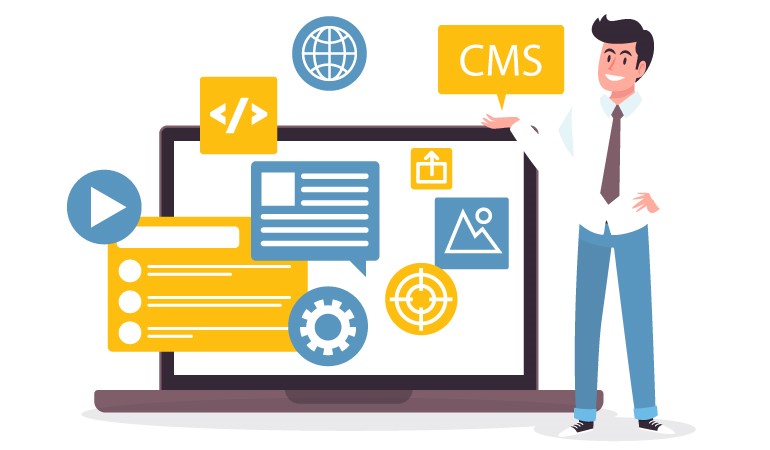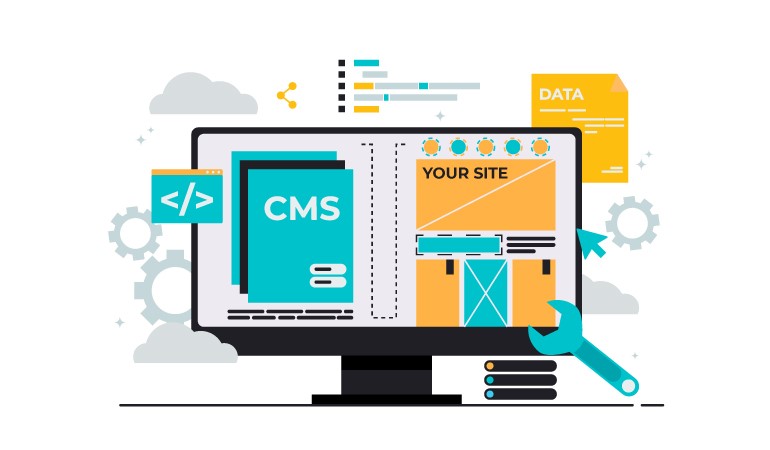In 2021, the total value of worldwide e-commerce sales crossed the $5 trillion mark. And as the upward trend continues, businesses are expected to make record online sales in the coming years. However, to be a part of that league of enterprises harnessing the power of digital, you need to possess the right mindset, skills, and tools. A good content management system (CMS) is one of the crucial tools that every e-commerce business requires.
But the question is, with so many options available today, how do you decide which content management system to go with? This article aims to answer that question for you so that you don’t end up choosing a CMS that doesn’t meet your unique business needs.
But first, let’s explain what is a content management system in an enterprise web presence.
What is a Content Management System?
Here’s an elementary definition of a CMS: a software program that helps you manage a website’s content. The website content can be in any form – images, videos, text, sound, etc. In other words, a CMS allows you to manage digital content by letting you edit, create, and publish it.
Moreover, using a content management system reduces your dependency on a single resource or department for content management purposes. Instead, you can assign content production to an author, set a publishing date, and track its progress after publication.
Most content management systems available today are built such that they require little to no IT-specific or technical knowledge. For example, you don’t have to be a software engineer to develop a WordPress website. Your CMS will manage all the background processes necessary for your website to function properly. WordPress is a widely used open-source content management system with a plugin architecture and a template system called WordPress Themes.
All CMS platforms enable content management, but CMS platforms for e-commerce websites and online stores are slightly different. These platforms are geared towards helping you build an online store; you can add promotional banners, build product listings, and create, edit, and publish product pages.

However, no one-size-fits-all solution exists, as no CMS can cater to all possible situations. Therefore, you must choose a CMS platform that helps you meet your business goals, aligns as closely with your team’s strengths as possible, and reaps dividends in the long run.
Before we give you tips on choosing the suitable content management system for your business, here are some questions you should ask yourself before deciding on your choice of CMS.
- What is the type of content you want to publish? Is it a blog aimed at disseminating information or a website with products listed on it?
- Which platforms do you want to use?
- What is your ideal customer profile, and how many users will you attract to your site?
- How long, on average, does each user visit your website?
Answering these questions will help you set targets and goals for your website. Once you have set these goals, evaluating your CMS’s performance will become easy.
8 Tips on How to Choose the Right CMS
Here are some handy tips you can use to choose a suitable CMS for your enterprise.
-
Avoid heavy technical reliance
The ideal CMS for any organization is one that shortens the content development time and makes it independent of your business decisions. If your content management system requires heavy support from a developer, it will delay your content development and dissemination period.
Therefore, you should choose a platform that enables you to focus on executing content marketing campaigns geared towards increasing website traffic, generating leads, and building brand reputation. This is only possible if you don’t spend most of your time managing the system as opposed to utilizing it.
-
Scalability
Scalability is a critical element of successful content management systems. Also, given how market dynamics change rapidly, scalable technology solutions are the only viable options for businesses. In an era of rapid transformation and shifting customer demands, any technology that is difficult to scale will inevitably lead to issues. Therefore, choose a scalable content management system.
-
Avoid building a custom CMS
Don’t even consider building your custom CMS. Yes, building an in-house CMS platform is a very tempting idea, but it is easier said than done.
No amount of planning is enough to ensure that your platform will deliver results and live up to your expectations. Building a well-functioning content management system takes years and years of development experience. Even if you have the necessary skill set, you will require constant support from your developers to maintain the platform.
As a result, your long-term IT costs will increase significantly. In fact, they are likely to increase to such an extent that they outweigh the costs of buying a CMS solution.
-
Don’t restrict your CMS to one code
Many leading CMS platforms like Oracle and Shopify require specialists to run them. As a result, your CMS is tied to one or the other programming language, making programming specialists indispensable for you.
This increases your reliance on IT experts like software developers who possess domain-specific expertise, causing workflow bottlenecks. To overcome this problem, you should choose a system that allows your developers to code using their preferred programming languages.
-
Reliable support
Reliable, consistent customer support is also another crucial success factor for a CMS. You can have an excellent CMS platform that meets all your needs, but it’s useless if it doesn’t offer support when you need it. Therefore, platform support is crucial – you should choose a platform that causes the minimum number of disruptions and offers round-the-clock support to your development team.
-
User-friendly with an intuitive UI
The best CMS options are the ones that offer the most user-friendly UX/UI. Having an intuitive, delightful, and responsive user interface helps your team of developers and content managers navigate the platform.
Your team should be able to seamlessly edit, create, organize, manage, and publish content using the CMS. It should not make their workflow more complicated by making technical knowledge a prerequisite for its efficient use. Instead, a person with average technical knowledge should also be able to operate the CMS, i.e., create product listings, upload product images, edit product descriptions, etc.
-
Get a proof-of-concept and test the CMS
It is essential that you test the CMS and proof-of-concept before deploying it for your entire website. You can start by implementing a section of your website first, say the products page. Ensure your team can upload product images, create product listings, add/remove text from the page, etc., without hiccups.
These proactive steps will allow you to become familiar with the CMS workflow. It will also help identify possible issues that may arise in the future and rectify them then and there.
-
Omnichannel support
When you begin your online store or develop a website for whatever purpose, it is possible that you choose to use only one communication medium – smartphones. You build a website using the mobile-first approach.
However, there may come a time when your website or online store starts gaining an audience that uses desktops, tablets, and laptops rather than smartphones. In such a case, you will struggle to deliver content to these other platforms via your CMS. Hence, choose a content management system that supports omnichannel content delivery and management – one that supports new content delivery channels.com
Conclusion
The rise of the digital era has completely transformed the business landscape. New technologies, tools, and methods have arisen that help enterprises sell products in unique ways. This is what digital transformation is all about.
However, companies that refuse to adapt to the changing times will undoubtedly be overtaken by their smarter, open-to-change competitors. Content management systems (CMS) play a pivotal role in enhancing a company’s digital marketing and e-commerce capabilities.

As digitization continues to pick pace in the coming years, we will witness more CMS options in the market. If you remember the tips in this article, you will not go wrong in choosing the most appropriate CMS for your organization.
If you’re still unsure about which platform to choose, contact us at [email protected]. Our team will schedule a free consultation session to discuss your business needs and the CMS that is likely to meet them best.

